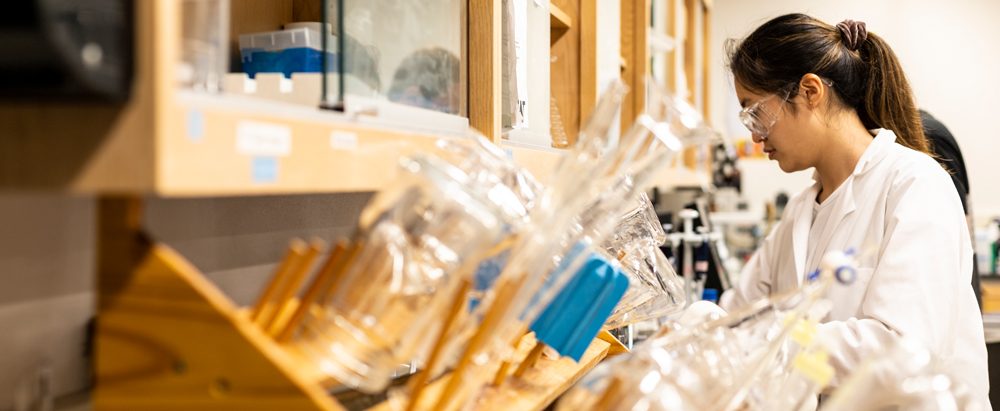
Chemical engineers at UW design the molecules, materials and devices that enable us to better treat disease, produce clean energy and live more sustainably.
The skills of chemical engineers are well-suited to creating impactful solutions to a range of complex problems. In UW ChemE, researchers work at the nano and molecular levels to develop advanced materials; they collaborate with medical researchers in the design of better therapeutics, medical devices, and diagnostics; and their pioneering data science work is driving innovation in semiconductors, solar cells, materials characterization, and chemical and biological discovery.
At its core, chemical engineering deals with systems and processes that transform low-value materials into products that impact lives every day. The food we eat, the paper we write on, the batteries and semiconductor chips that run our technology, and the pharmaceuticals and advanced medical technologies keeping us healthy have all been touched by chemical engineers. ChemE’s make valuable contributions to many sectors of the economy, and their versatility places them at the forefront of solving some of the world’s most pressing problems.
Chemical engineers design for scale and affordability
They not only formulate a medication to be safe and effective; they also consider how it can be manufactured afforadably at scale and delivered to the places it’s needed. Manufacturing methods perfected by ChemE’s have enabled computers that once filled entire rooms to become more powerful by orders of magnitude, fit in our hands, and be broadly accessible to consumers. And chemical engineers are key players in creating a greener future. They’re developing clean energy technologies, low-carbon industrial processes, waste upcycling methods, and more, at a scale that can move the needle.
Chemical engineers take a systems-oriented approach
They are trained to look at the relationship between a single component of a process and the entire process in a wide range of application areas. For example, they might quantify the role of a single brain cell within the context of its environment, its relationship to other cells, and the function of the brain. Those insights can lead to a “smarter” therapeutic that selectively alters the cell’s function. In another application, chemical engineers can look at water samples from lakes, treatment centers, and homes both individually and as part of the whole system to identify where to make the mostaffordable and impactful changes.
Chemical engineers apply a deep understanding of chemical processes
They examine the basic building blocks of chemical processes in order to optimize, scale, and transform entire processes in innovative ways — much like a Lego aficionado can turn simple blocks into a masterpiece.
Chemical engineers leverage training in reactor design
They are the only engineers with this particular training. A reactor is anything that transforms a low-value raw material such as natural gas into high-value products, like the polymers and fibers used in the lightest and most fuel-efficient aircraft. Reactor design is central to the mass manufacturing of nearly all consumer products; for understanding how drugs interact with our bodies (each organ is effectively a different kind of reactor); for more-efficient and long-lasting batteries, which are reactors that use chemicals to produce electricity; and for computer chip manufacturing, which requires the movement of a silicon wafer through a series of reactors.